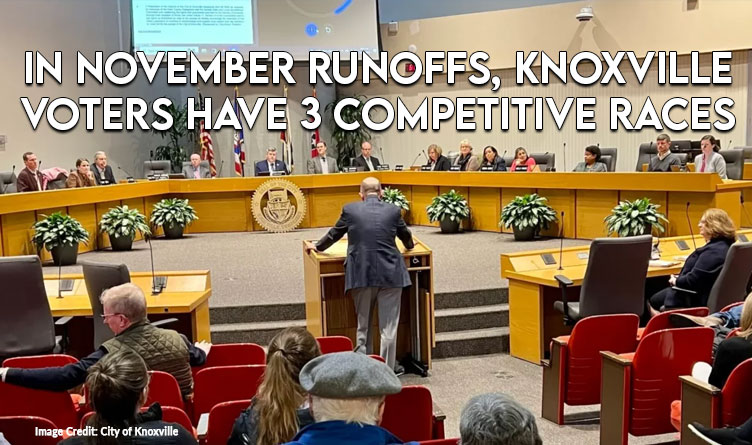A judicial race features a face off between a novice and 30-year veteran.
Image: A Knoxville City Council meeting. Image Credit: City of Knoxville
By Lucas Brooks [Tennessee Lookout -CC BY-NC-ND 4.0] –
The upcoming Knoxville municipal runoff election includes three competitive races, one of which could reshape a city institution that has long been the purview of one man. The other features familiar names in the real estate development game attempting to make the jump to city council. The voters will decide whether a developer’s mindset is what the city needs to get out of its housing crisis, or if two women with long histories of community activism are better choices.
Early voting continues through November 2 at select sites and election day is November 7.

Municipal judge
The race for the Municipal Judgeship of Knoxville’s City Court is a study of candidate dichotomies. Judge John Rosson Jr. is the longtime incumbent with more than three decades on the bench in addition to maintaining his own law practice. His challenger is Tyler Caviness, a former public defender who has been alive for fewer years than Rosson has been Municipal Judge.
A contested municipal judge race is a rare treat for Knoxville. The last time one was held was in 2003, with Rosson beating his opponent by more than 30 points. All told, Rosson has been a municipal judge for Knoxville for more than 35 years, first being appointed to the position way back in 1986.
Caviness is campaigning on bringing a fresh perspective to the court after so many years under Rosson’s leadership. He is advocating for equal access to justice and implementing a more user-friendly court website. Caviness has also committed to creating a citizen’s advisory board so that the court can better address community needs and issues.
Rosson is running on his decades of experience in office as well as the improvements he has made over time to make coming to court more efficient and user-friendly, hitting back at a chief complaint of Caviness’s.
A large part of these improvements and efficiencies rests on keeping the court on pace with new technology, such as the large television Rosson installed to better view documents and evidence. However, showing off these changes in a press conference for his campaign with media members violated the state’s Code of Judicial Conduct. Filming within the courtroom for campaign purposes is strictly prohibited as is using municipal facilities for private gain. In the same press conference, Rosson announced endorsements from the other two candidates in the primary — Andrew Beamer and Mary Ward — both experienced attorneys.
Caviness outpaced Rosson in both fundraising and expenditures in the third quarter. He earned financial support from several local attorneys and law professors with the University of Tennessee’s College of Law, where he is an adjunct professor, as well as from Joan Ashe, wife of former Knoxville Mayor Victor Ashe, and former Democratic legislative candidates Greg Mackay and Virginia Couch.
Rosson loaned his campaign $6,000 for the quarter, making up nearly half of his fundraising. In addition, he also received a donation from Lenoir City Mayor Tony Aikens’ campaign account.
Both Rosson and Caviness’s largest expenses were for signage and direct mail.
Although this race is officially nonpartisan, Rosson has been endorsed by the Knox County Republican Party, and received donations from the county party and the West Knoxville Republican Club. The Knox County Democratic party did not endorse in the race, but the Democratic Women of Knoxville donated to Caviness, and his campaign manager, Jack Vaughan, is on the Democratic state party’s executive committee.
Throughout the campaign, there has been an undercurrent of age at play from both candidates in the runoff. Rosson is casting Caviness as a novice without the necessary professional experience to handle the responsibilities of the court. In return, Caviness depicts the entire city court system as held back by Rosson’s antiquated practices.
The election is likely to be close, but it will be interesting to see if those who supported Mary Ward or Andrew Beamer in August abide by their endorsement of Rosson, or back Caviness to see a new municipal judge for the first time in this century.

City Council at large, Seat B
The race for City Council at large, Seat B pits local community advocate and retired labor leader Debbie Helsley against Mechanicsville homebuilder R. Bentley Marlow.
Helsley is not a newcomer to local politics, winning almost 45% of the vote for Knox County Mayor in 2022 as the Democratic nominee and serving for two terms on the city’s Civil Service Merit Board.
Helsley and Marlow share a philosophy on addressing the city’s housing shortage, as both want to target issues with the zoning code that discourages medium-density housing, sometimes called “Missing Middle” housing. Both candidates want to increase funding for homelessness resources and create alternative response teams for mental health crises.
But Marlow called homeless people “rabid animals” in 2019 and suggested they be euthanized, statements he recently said were intentionally inflammatory to direct more attention to the issue.
Helsley has been an advocate for simple good governance, ensuring that the city is performing its regular duties effectively and reliably. Marlow’s platform centers on protecting the integral character of the city, focusing on quality of life and the city’s culture.
Helsley and Marlow were similarly matched in third quarter fundraising. However, Helsley has far more cash on hand and the ability to spend heavily in the closing weeks of the campaign.
Prominent donors for Helsley include Councilwoman Seema Singh, while Marlow has both the financial and political backing of outgoing Councilwoman Janet Testerman, the current officeholder for Seat B. Helsley also received donations from the Tennessee Laborer’s PAC and the Democratic Women of Knoxville.
Marlow’s largest third quarter expense by far was for several rounds of advertisements through Facebook, while Helsley’s was to her campaign manager, Jack Vaughan — who is also Caviness’s manager.
This race is likely to be the sleepiest of the bunch. Helsley finished nearly 40 points in front of Marlow in the August primary, but city law requires all council races with more than one candidate to head to a runoff, even if one candidate won a majority in the primary. The race has been low-key and uneventful, so expect the November result to mirror August’s.
City Council at large, Seat C
The City Council at large, Seat C runoff features incumbent Councilwoman Amelia Parker against real estate developer Tim Hill. Parker has worked as a grassroots organizer and non-violence activist in addition to her elected role on city council. Hill currently serves as the chair for the Knoxville-Knox County Planning Commission and as a board member of the Knoxville-Knox County Sports Authority Board, currently overseeing the construction of the new Tennessee Smokies baseball stadium.
Parker is campaigning on her accomplishments in office and continuing her record of supporting progressive causesl. She wants to expand mental health resources, especially in instances of crisis intervention. Parker is also an advocate for increasing funding for affordable housing programs and securing representation for low-income residents on utility boards.
Hill’s campaign has focused on increasing resources for public safety and using his professional experience to bolster city efforts for economic development. That same professional experience is the source of his plan for addressing the city’s affordable housing shortage, which is to build itself out of the problem through increasing density and public-private funding. On the whole, Hill views the city as playing a supporting role in addressing the problems that plague it, supporting and encouraging best practices from private actors rather than directly intervening with additional programs or other measures.
Parker and Hill raised comparable amounts in Q3, but nearly half of Parker’s fundraising came from one source. She received a donation of $5,000 from the Tennesseans for Clean Energy PAC, which recently supported progressive Memphis mayoral candidate Van Turner. The PAC is a part of the political arm of the Southern Alliance for Clean Energy. Parker also received support from the Democratic Women of Knoxville to the tune of $200. Her largest expense was $2,900 for direct mailers for voters.
Hill is vastly out-spending Parker at this point in the race. Based on his spending alone, anyone would be forgiven for mistaking this race for a semi-competitive General Assembly race, rather than one for a city council seat. Hill has the support of the Knox County Republican Party and the Republican Women’s Club, along with a donation from the Building Industry PAC.He is running an extensive canvassing operation and has spent over $25,000 on marketing and signage. Nick Pavlis, a former member of Knoxville City Council, is managing Hill’s race.
Parker finished first in the August primary, but Hill has an advantage due his cash on hand. Both candidates are well-known in the community and there was a strong geographic divide in their support in the August election: Parker cleaned up downtown and in East Knoxville, while Hill tussled with another candidate, Matthew Best, for support in West and North Knoxville. With Best not advancing to the runoff, Hill seems strongly positioned to gain the support of the high-turnout voters in the city’s wealthier neighborhoods.



